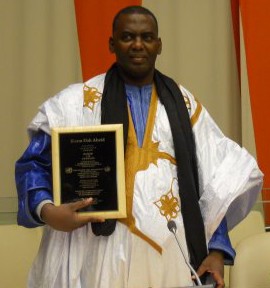A Mauritanian Abolitionist Visits the United States (The New Yorker)
By Alexis Okeowo
,
In Mauritania, the Beydanes, a minority Arab-Berber ethnic group, dominate the political and economic landscape, and for centuries have enslaved a black ethnic group called the Haratin. In 1981, Mauritania became the last country in the world to abolish slavery, but it persists, even as the government denies it. Abeid, a descendant of slaves, founded the Initiative for the Resurgence of the Abolitionist Movement (known as IRA), in 2008. (In 2014, I wrote for the magazine about his work.) More recently, Abeid has gone after the government’s practice of seizing land that the Haratin and other blacks have lived on and worked, and giving it to cronies, local élites, and foreign investors. The large population of Afro-Mauritanians, black Muslims who faced ethnic cleansing and deportation in the nineteen-eighties and nineties but who have never been enslaved, is as vulnerable to land dispossession as the Haratin.
In November, 2014, Abeid, Ramdhane, and several other activists conducted a caravan tour through the fertile southern valley near the Senegal River, stopping in communities to talk with Haratin and Afro-Mauritanian farmers about their land rights. “The government came and gave away all their lands,” Ramdhane said. “They are now forced to work for these new landowners just to get food—we call that land slavery.” The activists fear that blacks are vulnerable to being enslaved or to entering into serf-like relations as new owners take possession of their lands, and they advised the farmers to work hard and to protest until laws are passed to protect them. Abeid, a devout Muslim, has long incorporated religious arguments into his protests against slavery. Islamic law, he said, argues that land belong to those who work it. He wants black farmers to “push the power to understand that they are not implementing either Islamic or Mauritanian law.”
That November, the caravan reached the outskirts of the city of Rosso. Local police confronted the activists and arrested several of them. Abeid and Ramdhane were kept in prison the longest, at first in hot, remote areas and then in the capital, Nouakchott. In May, Mauritania’s Supreme Court overturned their two-year sentences, reversing an appeals-court decision, from August, 2015, that had upheld them. It was a meaningful moment for the activists. That same week, two slave owners were each sentenced to five years in prison and were ordered to pay compensation to their victims, in the country’s second-ever slavery prosecution.
After Abeid and Ramdhane’s release, the State Department invited the pair to the U.S. to recognize their efforts to stop slavery. On June 30th, Secretary of State John Kerry presented them with one of this year’s Trafficking in Persons (TIP) Report Heroes Awards, in Washington, D.C. The two activists spent the next two months meeting with officials at the State Department and with supporters, and travelled to the Democratic National Convention. Steven Feldstein, the Deputy Assistant Secretary of State in the Bureau of Democracy, Human Rights, and Labor, has long followed Abeid’s work. “We’ve got to push the Mauritanian government both privately as well as publicly in the right ways to do more,” Feldstein said, explaining that having Kerry personally deliver the remarks “was something very deliberately done.” He continued, “Our sense of the government is that, while certain small steps have been taken, like anti-slavery legislation and the establishment of a court, without putting the resources behind it and without actually doing something much larger on the enforcement side, I think these small steps are really just the beginning point.”
Abeid intends to pressure the government to extend legal recognition to IRA. Feldstein said that the State Department agrees with this position, and that “it’s something that we’ve messaged pretty consistently to the Mauritanian government.” Mauritanian officials do not appear to have been much impressed. In the month after Abeid and Ramdhane met Kerry, thirteen of their fellow-activists were arrested. Abeid ran for President in 2014, and plans to run again, in 2019. In the last election, which was marked by allegations of voter fraud, Abeid received nine per cent of the vote. “Our goal is to disturb an unfair society and expose its injustices,” he said.
You may also like ...


